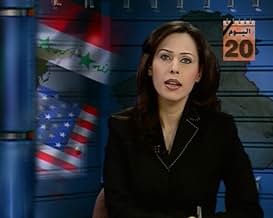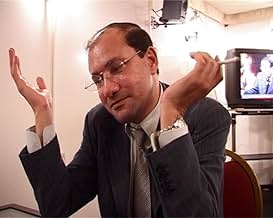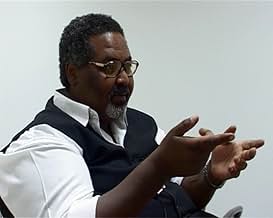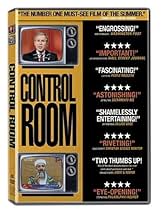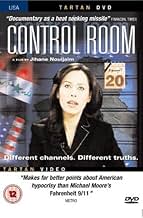IMDb RATING
7.6/10
5.3K
YOUR RATING
A documentary on perception of the United States's war with Iraq, with an emphasis on Al Jazeera's coverage.A documentary on perception of the United States's war with Iraq, with an emphasis on Al Jazeera's coverage.A documentary on perception of the United States's war with Iraq, with an emphasis on Al Jazeera's coverage.
- Awards
- 9 wins & 10 nominations total
Josh Rushing
- Self
- (as Lt. Josh Rushing)
George W. Bush
- Self
- (archive footage)
Donald Rumsfeld
- Self
- (archive footage)
- Director
- Writers
- All cast & crew
- Production, box office & more at IMDbPro
Featured reviews
Control Room is the latest film from the Egyptian-born Harvard-educated director of startup.com, Jehane Noujaim.
It follows the only independent news service in the Middle East, Al Jazeera, for six weeks, starting one week before the US invasion of Iraq in 2004.
The war's press coverage was delivered from US military Central Command in Qatar, right near Al Jazeera's HQ. One of the things Control Room demonstrates is just how manufactured the news stories of the war were.
We hear from several Al Jazeera employees (including women), some Western journalists and also from US Lieutenant Josh Rushing, the idealistic Central Command Press Officer.
There are several reasons why Control Room is compelling viewing. Firstly because Al Jazeera is an independent satellite service in a culture which does not have a history of freedom of the press.
Also, because both the US Government and many Middle Eastern governments condemn Al Jazeera for broadcasting propaganda, it reminds me of the conundrum often facing Australia's ABC. Yes, Al Jazeera gets it wrong sometimes, like any other broadcaster, but they are attempting and I'd suggest, often succeeding, at delivering relatively balanced journalism.
One of the things most criticized about Al Jazeera was for broadcasting messages from Osama Bin Laden. But I think just about any network that had that exclusive would do the same thing, as demonstrated by so many networks quoting the Bin Laden tapes. Unfortunately this is not covered in the film, but another Al Jazeera technique criticized in Control Room is their decision to broadcast footage of US military hostages, including the dead. As an NBC correspondent said, they just don't do that kind of thing in America. But it's very common for Western viewers to see and be shocked by horrific images on television. By broadcasting footage of these US soldiers, at least some of the Al Jazeera demographic would empathize with the suffering Westerners. Before that, much of their footage was of how Iraq's civilian population was suffering. In hindsight, now that it's been revealed that the US tortured prisoners, Al Jazeera's stance seems vindicated.
It follows the only independent news service in the Middle East, Al Jazeera, for six weeks, starting one week before the US invasion of Iraq in 2004.
The war's press coverage was delivered from US military Central Command in Qatar, right near Al Jazeera's HQ. One of the things Control Room demonstrates is just how manufactured the news stories of the war were.
We hear from several Al Jazeera employees (including women), some Western journalists and also from US Lieutenant Josh Rushing, the idealistic Central Command Press Officer.
There are several reasons why Control Room is compelling viewing. Firstly because Al Jazeera is an independent satellite service in a culture which does not have a history of freedom of the press.
Also, because both the US Government and many Middle Eastern governments condemn Al Jazeera for broadcasting propaganda, it reminds me of the conundrum often facing Australia's ABC. Yes, Al Jazeera gets it wrong sometimes, like any other broadcaster, but they are attempting and I'd suggest, often succeeding, at delivering relatively balanced journalism.
One of the things most criticized about Al Jazeera was for broadcasting messages from Osama Bin Laden. But I think just about any network that had that exclusive would do the same thing, as demonstrated by so many networks quoting the Bin Laden tapes. Unfortunately this is not covered in the film, but another Al Jazeera technique criticized in Control Room is their decision to broadcast footage of US military hostages, including the dead. As an NBC correspondent said, they just don't do that kind of thing in America. But it's very common for Western viewers to see and be shocked by horrific images on television. By broadcasting footage of these US soldiers, at least some of the Al Jazeera demographic would empathize with the suffering Westerners. Before that, much of their footage was of how Iraq's civilian population was suffering. In hindsight, now that it's been revealed that the US tortured prisoners, Al Jazeera's stance seems vindicated.
Two things moved me very much about this film:
The first was Lt Rushing, one of the US military media liaison officers at Centcom. His open-mindedness, fairness and plain decency are very rare to find in any spin doctor, let alone one working for an army during a war. He is a credit to himself, his family and his country, and I sincerely hope he hasn't suffered any professional repercussions for his honesty in this piece.
The second was the man who was the head of Al Jazeera. It was funny when he said he would accept a job at Fox News the second it was offered. But it turned out to be heartbreaking when he said as soon as his children are old enough, he'll send them to the US for education, in order to escape the "Arab nightmare" and live the "American dream". It's so sad that that part of the world is such a mess that even people who love it and have grown up there and are rooting for it recognise that there is little hope there for their children. If only that sentiment could be channelled into finding a solution for the problems in the Middle East.
The first was Lt Rushing, one of the US military media liaison officers at Centcom. His open-mindedness, fairness and plain decency are very rare to find in any spin doctor, let alone one working for an army during a war. He is a credit to himself, his family and his country, and I sincerely hope he hasn't suffered any professional repercussions for his honesty in this piece.
The second was the man who was the head of Al Jazeera. It was funny when he said he would accept a job at Fox News the second it was offered. But it turned out to be heartbreaking when he said as soon as his children are old enough, he'll send them to the US for education, in order to escape the "Arab nightmare" and live the "American dream". It's so sad that that part of the world is such a mess that even people who love it and have grown up there and are rooting for it recognise that there is little hope there for their children. If only that sentiment could be channelled into finding a solution for the problems in the Middle East.
I found myself watching this film by myself in the dark, got up half way into it and emailed every person in my family and extended family that they had to netflix this film.
I found that because it wasn't trying to be artsy, or controversial, or uncover any hidden secrets, this film truly worked magic in its "roll the cameras and lets see what happens" form of cinema.
I tried thinking of my favorite part of the film, but really, it was all amazing. Without making insinuations or suggestions, the film truly lets the viewer decide for himself what the real truth is, more so than in any Michael Moore film ever made on any subject. This film truly puts Michael Moore to shame.
Pay attention to every "character" in this film: they all have important roles on how the media and government, and in turn society, collide and interact.
I found it most amazing that any assumption or doubt I had about any of these characters were completely wrong in the end, and what you find is that they are all on the same side: the side of truth....the only problem is whose truth they believe.
I can't express clearly enough how important it is for everyone to see this film. If you saw Farenheit 9/11, you absolutely have to see this film. ABSOLUTELY HAVE TO SEE THIS FILM!!!!
I found that because it wasn't trying to be artsy, or controversial, or uncover any hidden secrets, this film truly worked magic in its "roll the cameras and lets see what happens" form of cinema.
I tried thinking of my favorite part of the film, but really, it was all amazing. Without making insinuations or suggestions, the film truly lets the viewer decide for himself what the real truth is, more so than in any Michael Moore film ever made on any subject. This film truly puts Michael Moore to shame.
Pay attention to every "character" in this film: they all have important roles on how the media and government, and in turn society, collide and interact.
I found it most amazing that any assumption or doubt I had about any of these characters were completely wrong in the end, and what you find is that they are all on the same side: the side of truth....the only problem is whose truth they believe.
I can't express clearly enough how important it is for everyone to see this film. If you saw Farenheit 9/11, you absolutely have to see this film. ABSOLUTELY HAVE TO SEE THIS FILM!!!!
I'll be the first to admit that this film is good but not great. All politics aside, I was just left hanging in the balance wanting MORE. Though I can appreciate their limited access to outside footage and English-speaking counterparts, certain scenes tended to drag on a bit and left me wondering what could have been.
That said, per my subject heading, I feel that this should be REQUIRED viewing for any concerned citizen grappling with the media coverage and news-spin of this and all other wars. Much like BRAVO's "Anatomy Of A Scene", the unfolding of the 'end of the war' and the subsequent toppling of Saddam's statue in the square both serve as serious examples of Al Jazeera news coverage vs. 'The Big Boys'. It's just completely different when seen through the intelligent, capable eyes of the Al-Jazeera staff than what we're spoon-fed by Fox, et. al. Check it out...... Really.....
That said, per my subject heading, I feel that this should be REQUIRED viewing for any concerned citizen grappling with the media coverage and news-spin of this and all other wars. Much like BRAVO's "Anatomy Of A Scene", the unfolding of the 'end of the war' and the subsequent toppling of Saddam's statue in the square both serve as serious examples of Al Jazeera news coverage vs. 'The Big Boys'. It's just completely different when seen through the intelligent, capable eyes of the Al-Jazeera staff than what we're spoon-fed by Fox, et. al. Check it out...... Really.....
I spent some of last summer in Spain, traveling alone for a couple weeks, as well as another week with my father, a Colombian immigrant. The two and a half weeks that I spent there alone were an unforgettable experience, despite the difficulty of speaking only the most basic, functional Spanish. I essentially knew how to order coffee and ask where the bathroom was, so I was limited to going into cafés and pubs and ordering what I could point to. Once my father arrived, speaking perfect Spanish, I was able to experience a much wider variety of what Spain has to offer (not the least of which is the astonishingly delicious paella), and my father, having not been back to Colombia in 35 years and never having been to Europe, was equally astounded not just by the class and sophistication of the country and its people, but by what could be found in bookstores.
Upon visiting the breathtaking Guggenheim Museum in a moderate sized town in northern Spain called Bilbao, my father came upon a Spanish book about the war in Vietnam. In perusing through the book, he and I were both shocked at the things that were shown in it, particularly of the atrocious acts of American soldiers. It's not portraying America in a bad light, just not portraying them only in a good light, it shows both sides, and it shows that the news outlets in America really play a serious role in, to use the red flag word, propagandizing wars.
Control Room is a study of the Arab news network al Jazeera and how this trend continues to this day. It is well known that the Bush administration is among the most secretive administrations in United States history, under the pretext of the struggle against terrorism and the dangers in alerting the public, and thus the enemy, to all of its policies and actions. What is truly disturbing, however, is the extent to which this secrecy, at some level justified, is so grandly abused. Donald Rumsfeld, our Secretary of Defense under President Bush, appears a couple of times vehemently condemning anyone associated with al Jazeera as a liar, propagandist, enemy of freedom, terrorist, etc. Basically he makes no secret of his opinion that the network itself is a terrorist organization populated and run by all of the above caricatures created by the rhetorical Bush administration.
The movie's most moving sequences, interestingly enough, are those that feature Iraqis, who look exactly what most Americans associate with the typical insurgent or terrorist, sitting around and debating what to do about the impending war, how to protect their children, their families, their livelihood, their lives. Where Michael Moore went completely over the top, showing kids dancing in the streets under Saddam and people getting married (his intent to show some level of normal life, even under Saddam, was instantly eclipsed by his opponents immediately pretending that he wants people to believe Moore thought it was all fun and games under Hussein), Control Room simply walks in with a camera, filming normal Iraqi men and women anxiously watching the news, fearful for their safety, not from Hussein and not even from their liberators, but from the invaders.
In one telling scene, an Iraqi man criticizes Saddam Hussein, itself a dangerous thing to do under the dictatorship, for not being more prepared for the incoming attack in order to protect himself. This man was disappointed in Saddam not for being a brutal dictator, but for allowing the Americans to take over.
The most damaging assessment that the movie makes against Americans is the way the Arab news outlets were destroyed. In one day, three separate attacks were clearly aimed at news outlets, under the pretense that they were distributing terrorist propaganda, but still with the result that it showed the Iraqi and all of the Arab world that the Americans want total control of what anyone hears about the war. As Bush said, you're either with us or against us. It kind of reminds me of how, if any newspaper or television news station or any kind of media outlet criticizes one of the countless blunders made by the Bush administration, it is instantly dubbed left-wing media by mostly the more idiotic right wing nutcases, like Rush Limbaugh, Michael Savage, and the malicious Ann Coulter.
Theaters and video stores, in the run up to the 2004 election, have been increasingly bombarded with a barrage of political documentaries, mostly after Michael Moore's Fahrenheit 9/11 opened the floodgates of political fervor in the film and video industry. Both sides are guilty of underhanded tactics, and Control Room is not entirely free of taking one side or the other, but it doesn't do it in the same way that Fahrenheit 9/11 twisted things and theorized, nor does it do it in the same way as Fahrenhype 9/11, which criticized Fahrenheit 9/11 as much as possible for as many different underhanded tactics as possible, and then went on to employ those same tactics itself.
Control Room is not a fancy documentary; it was filmed, I believe, entirely on MiniDV, which is becoming the standard in home video cameras, and is comprised mostly of people involved with al Jazeera talking about what it's like to work there, as well as interviews between al Jazeera reporters and American soldiers. Personally, the most disturbing moments in the film were the entirely believable suggestion that the Iraqis celebrating in the streets when Saddam's statue was torn down were brought in by the Americans for the purpose of the photo shoot (this is the definition of textbook military propaganda), and the sickening scene in which one soldier absolutely insists that the nation of Iraq is at least partially responsible for the chaos that followed the fall of Saddam.
This, more than anything else I've ever seen in news or any kind of media, is the clearest example of the total lack of any kind of postwar planning by the Bush administration. They were so clueless about what was going to happen even minutes after they succeeded in taking out Saddam Hussein (by the way, I say 'they' referring to the Bush administration, not to Americans as a whole, in which case I would, of course, use 'we') that I genuinely wonder if they even planned on how to get the soldiers back home to America, or if they thought that Saddam was gone so let's go back to Camp David and play golf.
Oops, there I go going over the top. Now I sound like Michael Moore. But the point that the movie sets out to make, and succeeds in very well, is showing that all sides are necessary. No one side can be in control of all news outlets, because that is a recipe for propaganda. And not only do we have to make sure to allow other people to broadcast their views, we can't just go in and destroy their news stations and claim that it was because they were terrorist agencies, because that act alone presents America as the bullies and, given our logic (or lack thereof) in attacking Iraq after 9/11 rather than seeking out that tragedy's perpetrators, we're doing badly enough in that area already.
Upon visiting the breathtaking Guggenheim Museum in a moderate sized town in northern Spain called Bilbao, my father came upon a Spanish book about the war in Vietnam. In perusing through the book, he and I were both shocked at the things that were shown in it, particularly of the atrocious acts of American soldiers. It's not portraying America in a bad light, just not portraying them only in a good light, it shows both sides, and it shows that the news outlets in America really play a serious role in, to use the red flag word, propagandizing wars.
Control Room is a study of the Arab news network al Jazeera and how this trend continues to this day. It is well known that the Bush administration is among the most secretive administrations in United States history, under the pretext of the struggle against terrorism and the dangers in alerting the public, and thus the enemy, to all of its policies and actions. What is truly disturbing, however, is the extent to which this secrecy, at some level justified, is so grandly abused. Donald Rumsfeld, our Secretary of Defense under President Bush, appears a couple of times vehemently condemning anyone associated with al Jazeera as a liar, propagandist, enemy of freedom, terrorist, etc. Basically he makes no secret of his opinion that the network itself is a terrorist organization populated and run by all of the above caricatures created by the rhetorical Bush administration.
The movie's most moving sequences, interestingly enough, are those that feature Iraqis, who look exactly what most Americans associate with the typical insurgent or terrorist, sitting around and debating what to do about the impending war, how to protect their children, their families, their livelihood, their lives. Where Michael Moore went completely over the top, showing kids dancing in the streets under Saddam and people getting married (his intent to show some level of normal life, even under Saddam, was instantly eclipsed by his opponents immediately pretending that he wants people to believe Moore thought it was all fun and games under Hussein), Control Room simply walks in with a camera, filming normal Iraqi men and women anxiously watching the news, fearful for their safety, not from Hussein and not even from their liberators, but from the invaders.
In one telling scene, an Iraqi man criticizes Saddam Hussein, itself a dangerous thing to do under the dictatorship, for not being more prepared for the incoming attack in order to protect himself. This man was disappointed in Saddam not for being a brutal dictator, but for allowing the Americans to take over.
The most damaging assessment that the movie makes against Americans is the way the Arab news outlets were destroyed. In one day, three separate attacks were clearly aimed at news outlets, under the pretense that they were distributing terrorist propaganda, but still with the result that it showed the Iraqi and all of the Arab world that the Americans want total control of what anyone hears about the war. As Bush said, you're either with us or against us. It kind of reminds me of how, if any newspaper or television news station or any kind of media outlet criticizes one of the countless blunders made by the Bush administration, it is instantly dubbed left-wing media by mostly the more idiotic right wing nutcases, like Rush Limbaugh, Michael Savage, and the malicious Ann Coulter.
Theaters and video stores, in the run up to the 2004 election, have been increasingly bombarded with a barrage of political documentaries, mostly after Michael Moore's Fahrenheit 9/11 opened the floodgates of political fervor in the film and video industry. Both sides are guilty of underhanded tactics, and Control Room is not entirely free of taking one side or the other, but it doesn't do it in the same way that Fahrenheit 9/11 twisted things and theorized, nor does it do it in the same way as Fahrenhype 9/11, which criticized Fahrenheit 9/11 as much as possible for as many different underhanded tactics as possible, and then went on to employ those same tactics itself.
Control Room is not a fancy documentary; it was filmed, I believe, entirely on MiniDV, which is becoming the standard in home video cameras, and is comprised mostly of people involved with al Jazeera talking about what it's like to work there, as well as interviews between al Jazeera reporters and American soldiers. Personally, the most disturbing moments in the film were the entirely believable suggestion that the Iraqis celebrating in the streets when Saddam's statue was torn down were brought in by the Americans for the purpose of the photo shoot (this is the definition of textbook military propaganda), and the sickening scene in which one soldier absolutely insists that the nation of Iraq is at least partially responsible for the chaos that followed the fall of Saddam.
This, more than anything else I've ever seen in news or any kind of media, is the clearest example of the total lack of any kind of postwar planning by the Bush administration. They were so clueless about what was going to happen even minutes after they succeeded in taking out Saddam Hussein (by the way, I say 'they' referring to the Bush administration, not to Americans as a whole, in which case I would, of course, use 'we') that I genuinely wonder if they even planned on how to get the soldiers back home to America, or if they thought that Saddam was gone so let's go back to Camp David and play golf.
Oops, there I go going over the top. Now I sound like Michael Moore. But the point that the movie sets out to make, and succeeds in very well, is showing that all sides are necessary. No one side can be in control of all news outlets, because that is a recipe for propaganda. And not only do we have to make sure to allow other people to broadcast their views, we can't just go in and destroy their news stations and claim that it was because they were terrorist agencies, because that act alone presents America as the bullies and, given our logic (or lack thereof) in attacking Iraq after 9/11 rather than seeking out that tragedy's perpetrators, we're doing badly enough in that area already.
Did you know
- Quotes
Lt. Josh Rushing: It makes me hate war, but it doesn't make me believe that we're in a world that can live without war yet.
- SoundtracksControl Room Intro Theme
Written by Kinan Azmeh and Dinuk Wijeratne on a theme by Béla Bartók (as Bartok)
Performed by Kinan Azmeh and Dinuk Wijeratne
Courtesy of Kinan Azmeh and Dinuk Wijeratne
Details
- Release date
- Country of origin
- Languages
- Also known as
- Контрольная комната
- Production company
- See more company credits at IMDbPro
Box office
- Gross US & Canada
- $2,589,616
- Opening weekend US & Canada
- $27,125
- May 23, 2004
- Gross worldwide
- $2,724,826
Contribute to this page
Suggest an edit or add missing content




